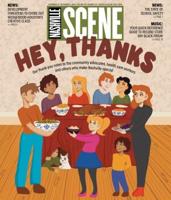Give this to Rep. Gino Bulso (R-Brentwood): The man is a filterless idea factory. The small-government lip-servicer will get an idea in his brain or a problem in his sights and just throw endless pieces of legislation at it hoping to solve whatever the hell it is by sheer tonnage.
And under that mass of paper and whereases, you can usually find a wee nugget — what Bulso is actually trying to accomplish while he distracts you with mass.
Take HB1828. Now, this is probably just a way for Bulso to complete the quest to get Tennessee to adopt the Bible as the state book, an effort he took up after Rep. Jerry Sexton retired. Even the Republican-dominated legislature was cool to that idea when Sexton championed it, for all the predictable reasons, asking questions like “Are we gonna have to defend this in court?” and “Which Bible are we talking about?” Since no one’s really agreed on that last one for about 2,000 years, it can get thorny, even in a state as overwhelmingly Christian-identifying as Tennessee. (That’s something Bulso ought to understand; his legislative bio says he’s Catholic, which means there are seven books in his Old Testament that aren’t in the Old Testaments at, say, Downtown Presbyterian.)
So enter HB1828, which designates 10 books as the official state book, much as Tennessee has eight state songs (really it has “Tennessee Waltz” and seven pretenders), including the Aitken Bible, notable for being the first Bible published in the nascent United States (and authorized by Congress!). The text of the bill defends that choice as particularly Tennessean (despite the fact the Aitken was published 15 years before Tennessee’s admission) because more Aitken Bibles are printed in Tennessee than anywhere, but that’s probably true of any edition of the Bible, given the sheer number of religious publishing concerns within her borders.
The Brentwood Republican says a century ago 'we had a consensus on sexual morality.' We didn't.
All that said, I think it’s fine that Bulso wants there to be state books. Having state books is the kind of thing that might encourage reading and since his usual MO is fussbudgetry aimed at keeping kids from reading books, let’s be gracious and say Bulso is making a good-faith effort at designating a canon that might say something about Tennessee and what it means to be a Tennessean. There are too few unifying pieces of culture these days that exist as culture-of-themselves instead of little badges we wear to identify that we are the Right Kind of Person and feel the right way about this or that political tendency.
That said, if we have state books, we should have some rules, and at the very least it should be that they are books and that they have something to do with the state in question. And so we can eliminate recency biases, no books by living authors.
Let’s dig into Bulso’s choices.
- “Farewell Address to the American People” by George Washington. Well. it’s not a book (or an address, for that matter … it was basically a newspaper column), and it was almost certainly written by Alexander Hamilton, not Washington. And neither one of them was from Tennessee, because it had only existed for three months when this was published. People should read it! Bulso should read it aloud during the next meeting of his caucus, what with its warnings about how unblinking party loyalty can lead to “frightful despotism.” But it doesn’t say anything particular about Tennessee or Tennesseeism. If you want to pretend an address is a book and put it on this list, at least use Doak’s Sermon at the Sycamore Shoals Muster, as it actually, y’know, pertains to Tennessee and could be the Volunteer State’s grito de Dolores. As for Washington: first in war, first in peace, first to get cut from the list.
- Democracy in America by Alexis de Tocqueville. Another one folks oughta read and another one that doesn’t say anything particular about Tennessee. In the bill, Bulso notes it was published a mere four years after the author visited Nashville. Et alors?
- The Aitken Bible. Bulso seems really committed to making sure we understand religion is important to Tennessee and makes a point that liberty that isn’t underpinned by morality leads to all kinds of catastrophes. Which is a valid point. Burke made that point. And debate about identifying the proper source of that morality is one worth having, though in a state where 86 percent of people consider themselves religious and more than half of adults attend religious services at least weekly, I’m not sure it’s necessary to hammer the point so hard. There used to be a time when Republicans actually tried to hew to whatever morality they were divining from the Bible or from the pew, but now they just wave the Bible around like a prop. If Democrats wanna have a little fun, they should amend the bill to replace the Aitken with one of those hippy-dippy translations from the ’70s where all the moral imperatives were flattened into vague and gentle exhortations to just love each other, man.
- The Papers of Andrew Jackson from the University of Tennessee. Finally, something with merit that speaks to the Tennessee of it all. First of all, that collection is an achievement; Jackson had a lengthy public life and there was a lot of paper. And Jackson was a monumentally consequential figure in American history and understanding Jackson is something Americans in general should do and something Tennesseans should do in particular. But we have to wrestle with his complications.
- Roots by Alex Haley. Another winner — a Pulitzer winner, in fact! — and the most commercially successful work by a Tennessean. Any compliments I have to offer would just gild the lily, but to the degree that a Great American Novel exists, Roots, with its multigenerational scope, fits the construct.
- A Death in the Family by James Agee. Another Pulitzer winner, another story of family, and this one includes an atheist pater familias! It works as a portrait of Knoxville, specifically, in the early 20th century, and it deserves its inclusion here and in the canon more broadly — though Agee’s work with photographer Walker Evans, Let Us Now Praise Famous Men, would be my preference.
- All the King's Men by Robert Penn Warren. I always considered Warren a Kentuckian — and so did he, despite his having graduated from Clarksville High and Vanderbilt. Either way, people should definitely read this book about what happens when a charismatic populist with authoritarian tendencies is surrounded by and enabled by toadies who are either ensorceled by the cult of personality or enamored with the power it leaks. Anyway, by this point, it’s clear Bulso was just looking at a list of Pulitzer winners from Tennessee, though it doesn’t explain why he left off Peter Taylor’s A Summons to Memphis (maybe because it says “Memphis” in the name), which, of course, should also be included (guess what? It’s about family!). Though my preference would be for Taylor’s In the Miro District. And where is T.S. Stribling’s The Store, which won in 1933 (the book is set in Alabama, though)? Or Cormac McCarthy’s The Road?
- American Lion by Jon Meachem. Disqualified for Meachem’s position on this side of the ether. The book’s great though, as the Pulitzer committee acknowledged, but it seems a little much to have it and Jackson’s papers both. Maybe here we note that there are three other living Pulitzer laureates with Tennessee ties Bulso didn’t include — playwright Katori Hall, novelist Richard Powers and poet Charles Wright.
- The Civil War: A Narrative by Shelby Foote. Foote, first of all, was at best a reluctant Tennessean and seemed content to be identified as a Mississippian instead. As a narrative, the book is great. It’s well-written and engaging and not at all a stodgy recounting of this battle and that. There’s a reason Ken Burns leaned on it so hard for his docuseries. I don’t hate it as much as historians do, in part because the writing is so good, but generously, it’s an artifact of its vintage (it was released in three volumes between 1958 and 1974), which means it engages in the sort of squishy Lost Causeism that infected much of the popular history of the Civil War, especially in the South, especially in the New South era. I don’t think that means the Foote should be consigned to the ash heap or anything, but it definitely needs some companion volumes from the era of the more complete history. Maybe one written by a Tennessean.
- A Coat of Many Colors by Dolly Parton. This is a children’s book (and the only entry on the list I’ve not read at least some of), and it was written by a thankfully still-living human. Its inclusion is cynical. It’s the legislative version of a mural that says “Y’all” on it somewhere. The book may well be an achievement of letters unseen on these shores since One Hundred Years of Solitude, but Bulso put it on here because he wanted Democrats to have to think twice about whether they wanted to be known as someone who voted against Dolly and the Bible.
Dolly’s inclusion and the rather slapdash decision-making process of which Pulitzer winners to include gives away Bulso’s game — he really only cares about getting the Bible in there and also making some ideological points with Washington, de Tocqueville and Foote. And that’s too bad, because he has a chance to make books a place where we come together instead of yet another battlefield in the culture war.






